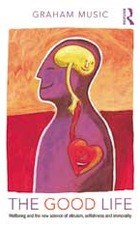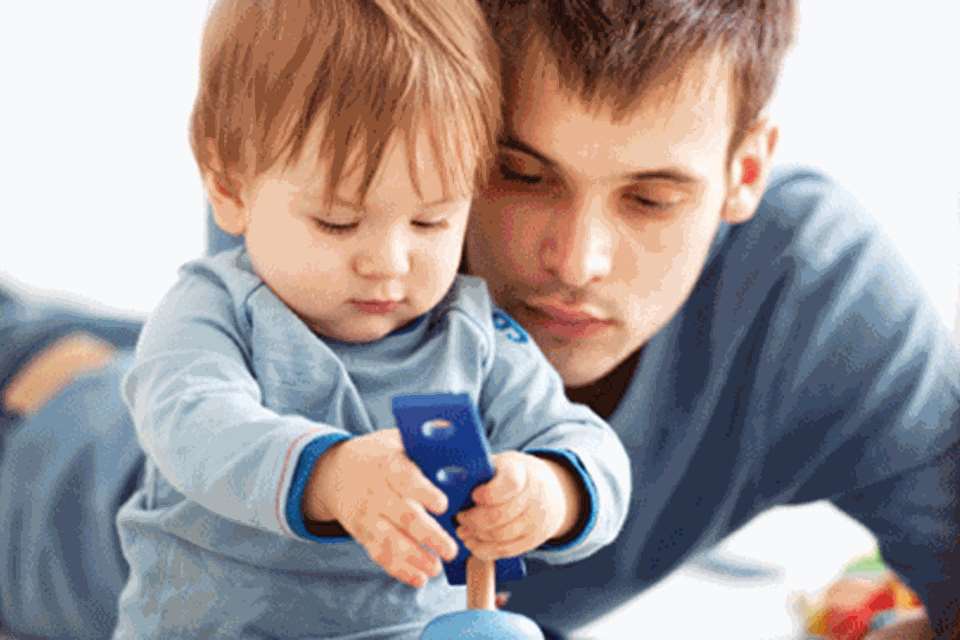A Unique Child: Child Development - Well and good
Hannah Crown
Monday, July 28, 2014
Research suggests that propensities to be moral, generous and helpful are 'online' surprisingly early in life, as Graham Music explains in an extract from his new book.

We are all born with tendencies to be selfish, aggressive and competitive -and human nature has been shown in nearly every known culture to have a capacity for deception, ruthlessness, violence, cold-blooded warfare and worse. However, as well as such unsavoury character traits, humans have an inbuilt propensity to be generous, helpful and moral.
In one of a range of ingeniously simple but very rigorous experiments by Michael Tomasello and his colleagues at the Max Planck Institute in Leipzig (Warneken and Tomasello, 2008) an adult is walking across a room and pretends to drop an object. Fifteen-month-old toddlers consistently come over and pick up the object and pass it to the adult.
In another variant, an adult places a pile of books into a cupboard, goes back for more, but has seemingly inadvertently closed the cupboard door, and on returning does not have a hand free with which to open it. Once again these toddlers cannot help but get up to open the cupboard. Such toddlers demonstrate a clear wish to help, and for no obvious ulterior reason.
Such sympathy for those in distress and reaching out to them is seen in infants as young as ten months old (Kanakogi et al, 2013). After watching one animated figure hurt another, infants spontaneously reached out for the victim rather than the aggressor or a neutral figure. Here and in Tomasello's experiments, we witness an intrinsic tendency for what Daniel Batson calls 'empathy-induced altruism' (Batson, 2011).
Here the act of helping is spontaneous, genuine and indeed pleasurable and provides its own reward. For this to happen, a few conditions must be in place. Most notably, the infant or toddler needs to be in a sufficiently relaxed and safe state of mind and, I think also, to have had enough attuned parenting early on for a basic capacity for empathy to develop.
When Tomasello and his fellow experimenters split toddlers into two groups and rewarded, with toys and smiles, just one of the two groups of children who had helped an adult, those who received no reward (and had no idea others were offered rewards) next time spontaneously and generously helped the most (Warneken and Tomasello, 2008). The rewarded ones lost interest in helping.
When mentioning this research, people have queried whether the unrewarded children keep trying 'selfishly' in order to get a reward. In fact, as Michael Tomasello told me, 'The kids in the No Reward never got any reward for 14 trials. Only the most resilient children would keep trying more than a few times.' The reward was in the act of helping.
Indeed, recent studies of toddlers under two years old showed that they even felt happier when giving treats to others than when receiving them themselves. Not only that, they were happier if the gift was costly and they gave up some of their own resources for another person rather than giving a treat at no cost to themselves (Aknin et al, 2012). Altruism and happiness are surprisingly interlinked.
INNATE MORALITY
We are born with inbuilt inclinations to be helpful and indeed also for being moral, findings that are a counterweight to our equally innate selfish potentials. Infancy researcher Robert Emde suggested that we need a concept of a 'we-go' alongside that of the infant ego (Emde, 2009).
It was not so long ago that most psychologists believed that children did not develop any kind of moral capacity until quite late in childhood, and that we were born egocentric, as the great Swiss psychologist Jean Piaget had suggested. Not for the first time psychology underrated the extraordinary capacities of infants.
Babies between three and five months can tell the difference between nice and nasty behaviour, as the research by Kiley Hamlin and Karen Wynn (2010) at Yale University showed in a series of fascinating studies.
Using video animations and puppets, they presented stories to babies. The protagonists were goodies and baddies. In one story someone was trying really hard to open a box, but annoyingly the partially opened lid automatically closed of its own accord. Babies were then later shown two alternative scenarios. In one a goody came along and helped the box stay open, while in the other, when after a great struggle the puppet opened the lid, a nasty character arrived and slammed it firmly shut again.
Babies as young as five months old, when given the choice after the experiment, nearly always chose the good puppet over the bad one. The same results have been found using lots of other stories and characters, and carefully controlling for a range of factors. Amazingly, babies as young as three months also prefer the kind characters; at that age they cannot reach out for their preferred character, but they look longer at it. This is a striking finding. It seems that we are born endowed with some clear pull towards good behaviour and even a rudimentary moral value system.
Babies look longer, in surprise, if sympathetic and friendly characters make friendly moves towards nasty ones; it seems that infants are aghast that anyone would approach someone who had done them harm. They do not look so long if the approach is towards the friendly figure; they seem to understand that it does not make sense to approach a scary person. Thus babies of only a few months have some understanding of what we might call good and bad behaviour.
It would be interesting to know what babies who have already suffered cruelty or abuse do in such situations. In one of the few studies linking parenting styles and helping behaviour, children watched as a mother and baby climbed some steps. The baby could not keep up, got upset and started to cry.
In one version the mother returned for the baby, and in the other the baby was just left. Securely attached children, who have had more attuned parenting, showed evident surprise when the baby was left, but the insecure children had the opposite reaction, showing surprise when the mother returned to her children (Johnson et al, 2007). Clearly the expectation of helpful behaviour is built on previous experiences. Good experiences are maybe necessary for our innate altruistic tendencies to come alive.
Understanding another's intentions, as the babies in these experiments did, is essential for making moral decisions or judgements. Deliberately pushing someone, as opposed to unintentionally knocking them over, will be judged differently by most of us. A court of law wants to know if the accused intended to hurt the victim or did so accidentally. The babies in these experiments clearly made sense of the intentions of the characters, and acted on this understanding. This sophisticated skill of reading intentions and other minds is the bedrock of being a social person, enabling fitting into whatever social group one happens to find oneself in.
We even see a sense of fairness at such young ages (Sloane et al, 2012). In a typical experiment, some animated giraffes were placed in front of 15-month-olds and along came a character with toys, and the giraffes showed excitement. When the toys were shared equally the babies barely reacted, seemingly because they expected fairness. However, if one giraffe got much more than the other, then the babies stared for longer and tended to look perturbed.
These same researchers found that when two people were equally rewarded for a task, but one of them was not pulling their weight, then 21-month-olds stared for longer, presumably in surprise or bemusement, protesting that this was not right. Indeed, verbal three-year-olds actively state that rewarding shirkers is unfair (Kanngiesser and Warneken, 2012).
Not all babies respond in exactly the same way and some are more perplexed by unfairness than others, looking for longer at such unexpected behaviour (Schmidt and Sommerville, 2011). These are babies who are more altruistic and generous and, for example, willingly give up their favourite toy if someone else asks for it. A million-dollar question is whether some babies are just born more altruistic or whether parenting makes the difference.
This is an edited extract from 'Primed for goodness', Chapter 2 of Graham Music's new book The Good Life -Wellbeing and the new science of altruism, selfishness and immorality (Routledge, £16.99)
THE GOOD LIFE
Just how good are we? In The Good Life - well-being and the new science of altruism, selfishness and immorality (£16.99), Graham Music draws on cutting-edge research and in-depth clinical experience to explain our innate predisposition to be altruistic and generous, and how this is influenced by our experiences with our families and society.
Dr Music provides an overview of psychological research from the past 40 years, demonstrating that materialism makes us selfish, and that we are primed to turn off the 'better angels of our nature' in the face of stress, anxiety and fear.
He demonstrates that it is possible to determine a child's attachment style at one year old, and that eight-month-old babies have already formed expectations of relationships that can be used to predict how they will interact with people when they get to nursery.
Dr Music also raises the question of whether modern Western childcare methods are good for psychological health, suggesting that 'being held, or close to others constantly, prompt attuned responses to signs of distress, breastfeeding more or less on demand for the first years, co-sleeping, several known caregivers in addition to parents ... and a lot of free-play with children of different ages' is strongly correlated to 'higher levels of empathy' and 'better emotional regulation and less impulsiveness'.
A therapist for 20 years, now working at the Tavistock and Portman clinics, London, Dr Music has worked extensively with abused children. He notes their capacity for change, citing the 'profound effects of compassionate psychological understanding on children, how they become softer after a good adoption, for example, blossoming and becoming likeable, kinder and more generous.'
To order a copy, visit www.routledge.com/books/details/9781848722279.









